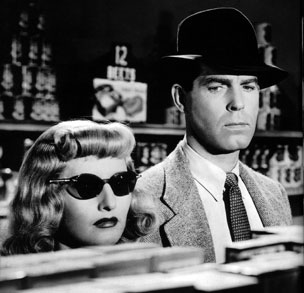Double Indemnity (1944) directed by Billy Wilder
I've been on the road the past couple days and will be for the foreseeable future. That means I'll be away from my home computer and my DVD collection, so I figured this trip would be challenging for my movie watching. The last thing I want to do is stay cramped up in my hotel room for four hours a day, but them the breaks as they say. Luckily, most hotels these days have wireless internet so I've been able to stream off Netflix and post these entrees. Unfortunately, the last hotel I was in had a spotty connection and it adversely affected my viewing of Double Indemnity. The resolution would suddenly get blurry and the frame rate a little choppy, which is a shame because most film noir that I have seen looks great with all the dark shadows and low key lighting, so it was kind of hard to appreciate this film visually. Nonetheless, the times when the image was sharp I thought it looked great.
Double Indemnity may very well be the best movie in the film noir genre. All the preconceived notions you may have of the genre is here; the morally ambiguous protagonist, the mysterious female lead, plotting, scheming, and, gasp, murder! There's the sharp tough guy dialogue and the cool interaction between the male and female leads. Obviously there is the signature cinematography with all the shadows and lowly lit rooms.
Sometimes I hate writing about obvious classics because what can I say that hasn't already been said? Any kind of profound insight I may have has undoubtedly already been said and probably much better so instead I'll just write about my impressions of the film.
First, there is the story. Walter Neff, an insurance salesman, walks into his office late at night, wounded and tired. He begins talking into a recorder and basically confesses to the entire plot of the movie. He says, "Yes, I killed him. I killed him for money, and a woman, and I didn't get the money and I didn't get the woman. Pretty, isn't it?" Then he tells the story in a flashback, how he meets Phyllis Dietrichson, how he immediately falls for her, and how they conspire to and ultimately murder her husband in an insurance scam through a double indemnity clause that pays double for a certain kind of death. Given how he is telling the story in this manner and says that he doesn't get the girl or the money, something clearly goes wrong, but what and why? This flashback narrative got me to thinking if whether or not the tension and suspense of the film is weakened since we sort of already know what happens. Since we are seeing the end of the movie at the beginning, we know the film has to progress in a certain direction to get to that point. Would the story be better told from the beginning rather than the end? It's hard to say but for Double Indemnity it almost doesn't matter because it is so well written.
Another thing I noticed is just how cool the dialogue is. Take for example the first encounter between Walter and Phyllis where they playfully flirt with each other. If you actually dissect's Walter's lines, clearly he is stepping out of bounds and is kind of a douche, but it doesn't matter because he sounds so cool saying it. Would you be able to hit on a married woman like that? The hard edged dialogue in the film was written by Raymond Chandler, a well known novelist at the time but new to Hollywood screen writing. He was hugely influential in the way hardboiled writing was written.
Sorry if this post is lacking in any analysis, but the film is so wonderfully shot, written, and acted and is such a heralded classic it seems almost pointless to heap more praise upon it, so I'll just say I loved this film and leave it at that.
Grade: A

No comments:
Post a Comment